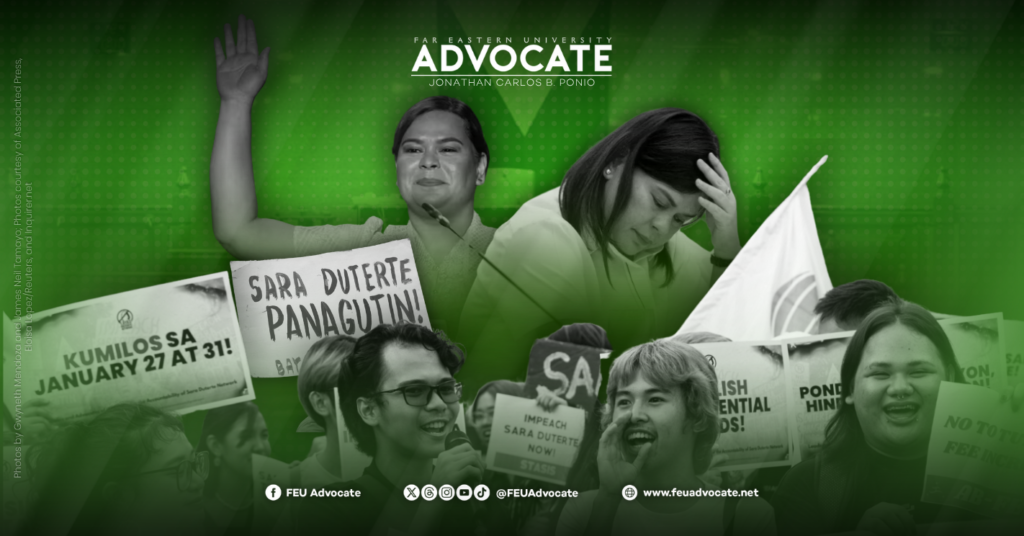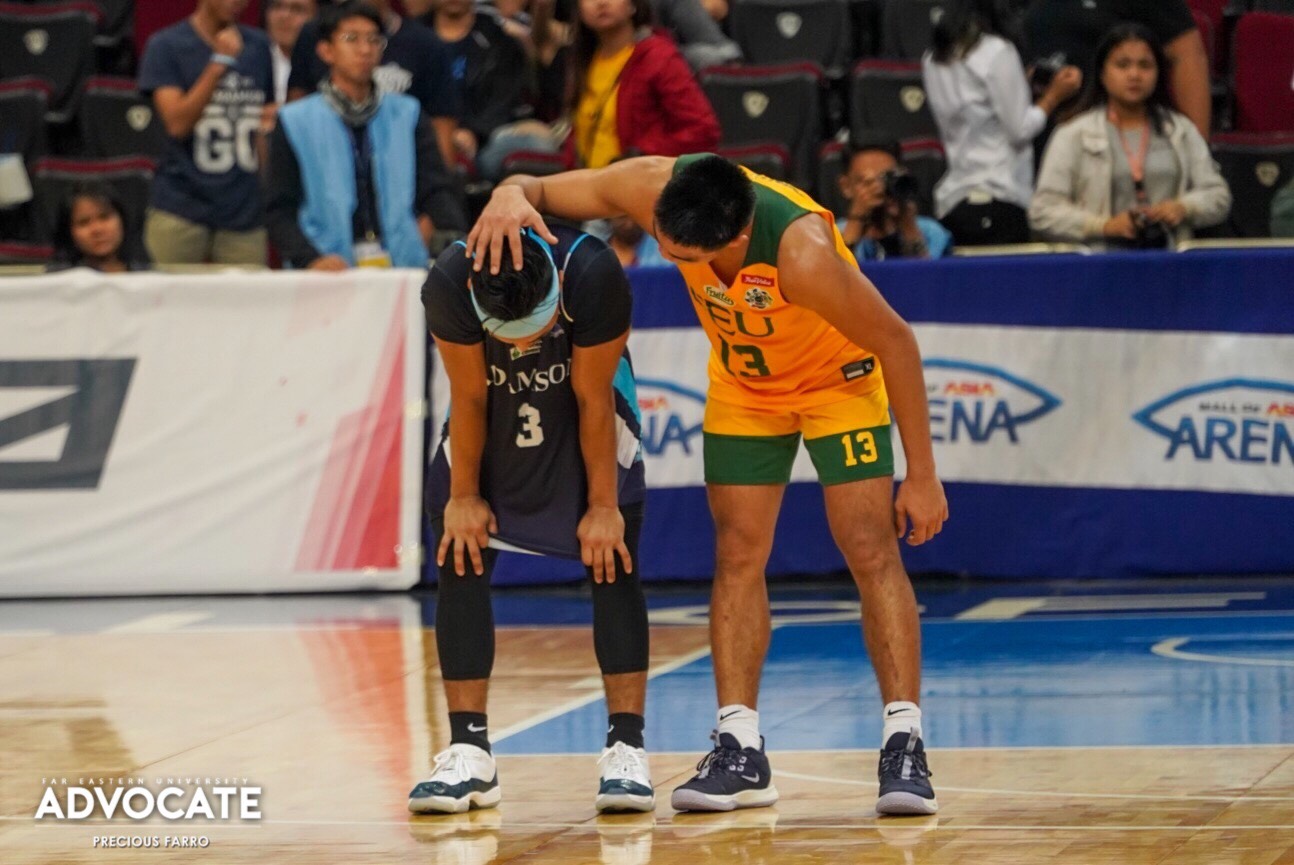
Limang Natatanging Binhi: Ang Pag-alala sa New Bataan 5
- April 13, 2022 03:49
FEU Advocate
June 18, 2025 13:28

Bente Kuwatro
By Mark Vincent A. Durano, Managing Editor
To convict Vice President (VP) Sara Duterte, public clamor must resound its sovereign will. But if academic institutions alone remain silent in demanding accountability, it circles back to a repressive education system that protects the elite, breeds impunity, and betrays every Filipino.
Duterte was already impeached in the House of Representatives last February, signalling an immediate trial in the Senate where they need two-thirds of the upper chamber to oust Duterte. However, the Senate only convened last June 10, only to end up returning the articles of impeachment to the lower chamber, once again delaying the accountability chasing the second highest official in the country.
Just like how the upper chamber was able to unprecedentedly bypass the Constitution, the ruling class has the power to bend laws. It is only high time that the masses, especially students, claim their position in society, or else the ruling class will isolate themselves inside the issues, perpetuating a cycle that excludes the people who would suffer the consequences of elite rule.
The neoliberal education system in the Philippines has long dulled the capacity of institutions such as Far Eastern University (FEU) to hone students’ conscience and social participation. It only stifles spaces for critical thinking and reduces education to a mere commodity.
If this persists, institutions as means of production will continue to form students’ ideologies, political consciousness, and the education they consume. After all, a political landscape that excludes the masses from conversations affecting every citizen—whether they realize it or not—shapes political consciousness.
Breaking the glass that isolates awareness from proactiveness requires greater public pressure, especially when political disillusionment fostered by an anti-mass political system has been dismantled.
Academic institutions, including FEU, should start taking a stand, not just in the conviction of VP Sara but in political movements and pro-student services. They are meant to be rightful spaces where students can challenge, question, and disrupt dominant narratives and the oppressive system that sustains them.
FEU has long been silent on social ills and even claimed being “traditionally apolitical” during the 2022 Elections. If other schools, especially in the University Belt, can pressure the government to uphold integrity, it reflects what kind of education system stops administrators from cutting across gray areas.
Whether if Duterte is convicted and proven guilty of her preconditional threat against Bongbong Marcos Jr. and his wife Liza and cousin Martin Romualdez, malversion of P612.5 million in confidential funds, bribery and corruption in the Department of Education, questionable wealth, and involvement in the extrajudicial killings in Davao City or not, civic environment, quality of public service, and condition of students’ lives in the country should matter consequently.
In a serious semi-legal matter like the impeachment trial of Sara, the youth may find themselves puzzled in their role in addition to public clamor. Thus, institutions should catalyze educational discussions and involve their students in the issue, using classrooms as spaces for socialization to nurture critical thinking and going back to the streets.
This recognizes the youth’s place in collective struggle, going beyond the surface level toward meaningful participation alongside the masses. Ultimately, the academe is also a battlefield for counter-consciousness in confronting social realities that permeate the University itself.
Academic freedom precedes an avenue for conscience. If repression strives without conversations in the academe itself, how can we expect students to become conscientious laborers, practicing professionals, or private citizens?
If institutions take pride in molding students into future professionals, then they must hold the same responsibility in nurturing democratic citizens. The so-called “real world” is already felt in the realities of lasting social ills. Institutions should recognize that students bear the brunt of corruption, inequality, and repression into their daily struggles as commuters, consumers, and Filipinos. They cannot simply remain indifferent to the struggles beyond the campus.
As students, VP Sara’s impeachment is not just grounded in stripping off titles, it constitutes transparency and institutional integrity towards officials’ accountability. Charges of culpable violation of the Constitution, bribery, graft and corruption, betrayal of public trust, and other high crimes should provide all the more reason to demand constitutional processes, even if institutions refuse to.
When the education system represses the youth to be the movement itself, it only reveals how frightened institutions are of what their major stakeholders could and should do—resist.
In the same vein, the Senate must listen to its major stakeholders to reaffirm democracy and loyalty to the Filipino people.
The Senate’s delaying tactics from transitioning from the 19th to the 20th Congress has eroded public trust. To proceed with the impeachment trial “forthwith,” sets the precedent on if public officials uphold integrity among themselves as well as if they adhere to what the law states or to what kind of justice must be served.
Inherently political impeachment trials further struggle to proceed “forthwith” if power play by involved bodies attempt to divert accountability and paralyze their responsibility: it must transcend intra-elite conflicts.
Whether refusing to immediately read the articles of impeachment or voting to convene the impeachment court, any desperate attempt to overthrow the Constitution will breed impunity.
The spectacles of Senators Robin Padilla, Imee Marcos, and Bato Dela Rosa to rise as the “opposition” to kill the impeachment trial should fire back as “functionally dismissed.” For any instance, the Constitution is unmistakably legal; thus, no definitions nor interpretations can reverse the sovereign will of the people.
Ensuring accountability through the lawful and legal process should all be for the sake of the Filipino people. It is not an isolated victory as it would always intersect with basic human life as students, women, queer people, laborers, Indigenous peoples, farmers, Filipino youth, and as Tamaraws.
It has been four months since the VP has been impeached in the lower chamber, the same amount of time where public funds could have served the people whom they were stolen from. The Senate has now delivered a writ of summons to Duterte with around three days left to respond, so there is no silent moment to waste.
In the event of Sara’s possible conviction, it would mark a foreground that the pressure of the people can once again oust a corrupt official and cement its significance to end the Dutertes’ lasting legacy of impunity and betrayal of public trust. Shattering this glass would be a precedent that people, the streets, and the classrooms have the rightful claim to democracy and it is up to academic institutions to uphold it.
(Photos by Gwyneth Mendoza and James Neil Tamayo/FEU Advocate; Photos courtesy of Associated Press, Eloisa Lopez/Reuters, and Inquirer.net; Layout by Jonathan Carlos B. Ponio/FEU Advocate)









